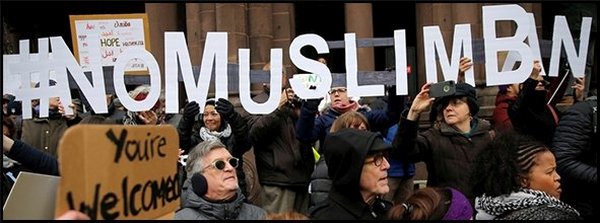(PHILADELPHIA, PA, 12/5/17) – The Philadelphia Chapter of the Council on American-Islamic Relations (CAIR-PA), the nation’s largest Muslim civil rights and advocacy organization, today expressed deep concern over the U.S. Supreme Court’s decision to allow President Trump’s “Muslim Ban” to be implemented until the court makes a final decision about the executive action’s constitutionality.
Yesterday, the court issued two orders staying the Hawaii and Maryland federal courts’ injunctions that had, until then, largely prevented the Trump administration from implementing Muslim Ban 3.0’s visa restrictions.
Although this decision allows Muslim Ban 3.0 to go into effect now, the court could still find it unconstitutional at a later date.
CAIR-Philadelphia Staff Attorney Timothy Welbeck said: “We strongly oppose this ban as it is inherently bigoted, xenophobic, and ultimately rooted in utter contempt for Islam. President Trump has made his discriminatory motivations clear since the campaign trail. Since becoming president, Mr. Trump has repeatedly attempted to ban Muslims from entering the United States, and yesterday the Supreme Court allowed the federal government to allow for this abhorrent discrimination. We find this deeply disappointing, but will continue our fight against hatred and discrimination.”

“This decision ignores the very real human consequences to American citizens and their families abroad imposed by President Trump’s Muslim Ban 3.0,” said CAIR National Litigation Director Lena Masri.
“The Supreme Court’s actions today are a good reminder that we can’t simply rely on the courts to address the Trump administration’s efforts to marginalize Muslims and other minorities,” said CAIR Senior Litigation Attorney Gadeir Abbas. “We must all do everything we can to oppose Muslim Ban 3.0.”
CAIR and the Brennan Center for Justice filed suit against President Trump’s Muslim Ban on behalf of six American Muslims impacted by the immigration restrictions. Civil rights attorneys, including CAIR National attorney Gadeir Abbas, delivered oral arguments against the ban in mid-October.
On appeal, this case, Zakzok v. Trump, was consolidated with two others and are jointly pending before the Fourth Circuit. Oral argument in the Fourth Circuit is set for this Friday, December 8th, in Richmond, Va.
Video: CAIR, Other Civil Rights Groups Hold Presser After Md. Court Arguments on Trump’s Muslim Ban
In a broad ruling on October 18th, U.S. District Judge Theodore D. Chuang granted CAIR and other groups’ request for a nationwide injunction prohibiting the Trump administration from implementing its latest attempt to exclude Muslims from the United States.
Judge Chuang ruled that the plaintiffs were likely to ultimately succeed in proving that anti-Muslim animus motivated the travel ban in violation of the Establishment Clause. He also noted that the ban violates federal law, which forbids the government from discriminating against visa applicants based on their nationality.
SEE: Second Judge Rules Against Latest Travel Ban, Saying Trump’s Own Words Show It Was Aimed at Muslims
CAIR welcomed a decision by another federal judge in Hawaii to block the Trump administration from implementing the ban. The judge’s decision only blocks the ban for 14 days.
SEE: CAIR Welcomes Federal Judge’s Decision to Block Trump’s ‘Muslim Ban 3.0’
Yesterday, CAIR joined a coalition of national and local American Muslim and civil rights organizations at the #NoMuslimBanEver rally and march outside the White House in Washington, D.C.
In September, CAIR — with the Brennan Center for Justice at NYU School of Law and Profeta & Eisenstein — filed an amicus brief with U.S. Supreme Court on behalf of seven American Muslims.
READ Amicus Brief
These groups also filed an amicus brief in the Ninth Circuit in August.
Read CAIR’s Amicus Brief
In January, just days after Trump signed the first Muslim ban executive order, CAIR filed suit.
SEE: CAIR Files Federal Suit Challenging Constitutionality of Trump’s ‘Muslim Ban’ Executive Order



